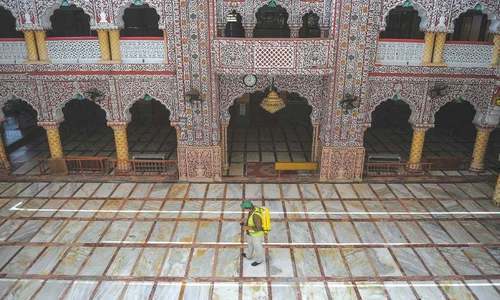Mufti Muneebur Rehman hopes for 'unanimity' in Saturday's meeting between ulemas, President Alvi

Mufti Muneebur Rehman, Chairman of the Ruet-i-Hilal Committee and the head of board for madressahs of Barelvi school of thought on Thursday expressed the hope that a "unanimous formula" could be readied in Saturday's meeting between President Arif Alvi and prominent religious scholars from across the country.
The president is due to meet prominent ulema and religious scholars from across Pakistan on April 18 to discuss opening mosques for worship and congregational prayers during Ramazan and finalise standard operating procedures (SOPs) for mosques.
Speaking after a meeting with Sindh Chief Minister Murad Ali Shah on Thursday evening, Rehman said Shah and provincial ministers also expressed the hope that a unified decision could be made on Saturday which the ulema would agree on and the government would abide by.
"It will be better for our country, our state, our nation," he said.
Speaking about Friday congregational prayers, the chief minister said that he would instruct the police that there should be no strictness inside mosques on Friday. However, all movement would remain suspended from 12pm to 3pm and only three to five people related to the mosque administration would be allowed to pray inside.
Shah also said that he had assured the prime minister that the provincial government would follow whatever SOPs the federal government decided.
Earlier, Federal Minister for Religious Affairs and Interfaith Harmony Noorul Haq Qadri met with Sajjada Nasheens of big shrines across the country in an effort to build consensus ahead of the meeting.
At a meeting held in Rawalpindi's Eidgah Sharif ground, the Sajjada Nasheens voiced support for the government's measures to curb the spread of Covid-19. They demanded, however, that the government along with issuing guidelines for preventive measures also allow worship in mosques during Ramazan.
The religious affairs minister also contacted heads of madaris, Punjab Ulema Board and members of the Council of Islamic Ideology and invited them to participate in Saturday's meeting at the President House.
A meeting of prominent religious scholars in Karachi on Tuesday had concluded that the lockdown imposed by the government to curb the spread of coronavirus was "not applicable to mosques".
Calling the congregational prayers a “necessity”, a statement released after the meeting said that it was important to continue the prayers while observing precautionary measures.
The meeting called for the resumption of all congregational prayers including the five daily prayers and the Friday prayers, terming the government’s orders of allowing between three to five people for congregations as “impractical”.
The statement urged elderly people, people affected by the virus or those caring for virus patients to not come to the mosque.













































